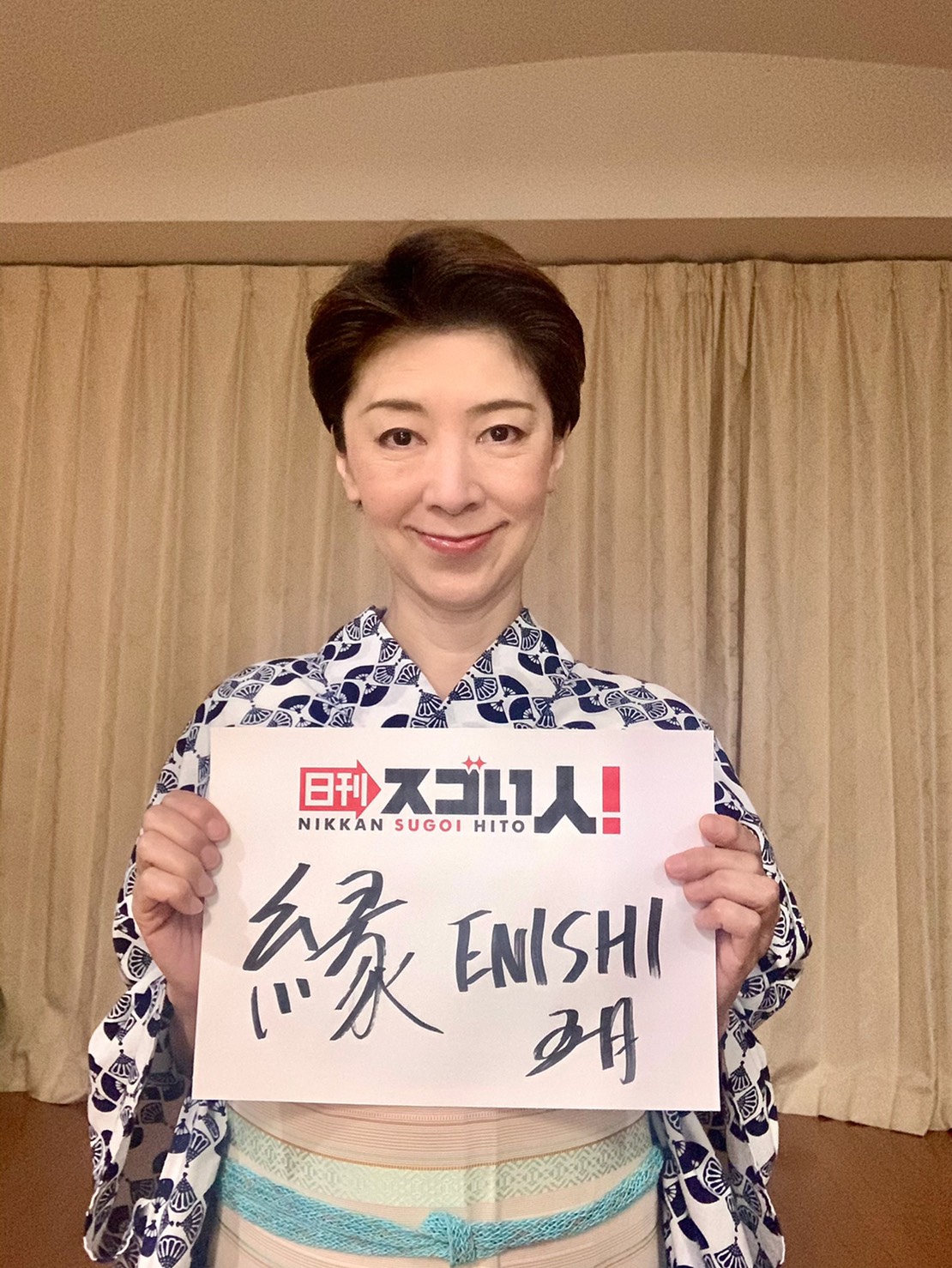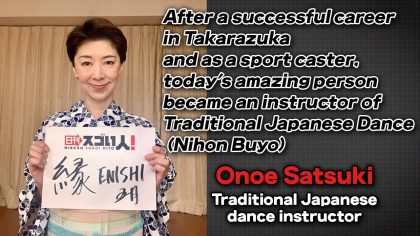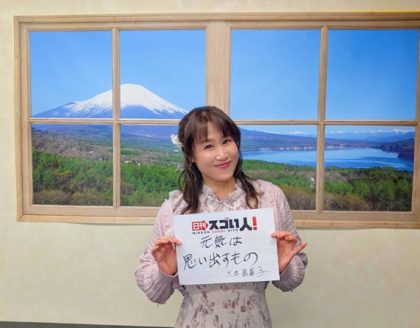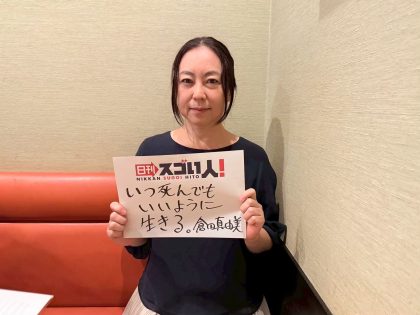
Onoe SatsukiToday's amazing person has played many roles, a member of Takarazuka (Famous all women Japanese Theatre group), a Sports Caster, and finally a traditional Japanese dance instructor.This time we would like to introduce a person who after growing up fought their way into the world of traditional Japanese dance, and now lives their life as an instructor. Their personal history is full of glamour with a heavy dash of stoicism. A woman who despite have realized her goals of a life anyone would be envious of, still to this day continues to fight on. Over 2 days we will tell you about the trials and tribulations she overcame, and how she now seeks to bring the wonders of traditional Japanese dance to the young people of Japan and the wider world. < YouTube >Highlights:

Her path naturally lead to Takarazuka
Charming the world of television
Finding her life calling in baseball a sport loves
DAY1
Bathing daily in the atmosphere of Takarazuka
A distant relative of my father, was a top star of Takarazuka. Her name is Yoko Minakaze.
Whilst I of course didn't know the time period that she was a top star, that relationship caused an interest in Takarazuka theatre in my family.
Therefore, from when I was small, my grandmother and grandfather would take me to the theatre.
There is also a story in my family that quite natural , I would all on my own (though I don't remember it) say “I'm going to join Takarazuka and play the role of a man”.
Of course, in Takarazuka the male roles are the stars.
To put it a little bluntly, I would boast that I was going to be a top star (laughs).
Luckily I was tall, so after joining school I managed to take on male roles.
My parents knew about my dreams, and so from elementary school they took me to piano and ballet lessons. Whilst I was a child my will to join Takarazuka was really strong, so I took the exam to go to a combined private middle school and high school.
I decided to do this, because taking the Takarazuka and high school exams at the same time would have been a heavy load.
I passed the exam and started attending an all girls private school for 6 years.
From a young age I had planned to join Takarazuka as I graduated from middle school.
However, my parents who at the time ran a pharmacy had expected me to at some point give up on these dreams.
In particular my father was strongly opposed to me entering Takarazuka, because when his relative, Yoko Minakaze, became famous she experienced all sorts of inconveniences and difficulties.
In the end he felt that his daughter entering the entertainment world was not something to rejoice over.
My mother was also very keen on education, but despite the fact that my family were a very strict and proper family, they supported me in my dream.
The Long yearned for Entrance into Takarazuka
At the age of 15 I graduated middle school and with no major problems enrolled in Takarazuka.
At the time thanks to people like Ran Otori who started the first Belle Bara (Beautiful Rose) boom, Takarazuka had become incredibly popular.
It's popularity had increased perhaps twenty fold.
Therefore, I think that those around me thought I wouldn't pass the entrance exam (laughs).
I kept saying I really want to enter Takarazuka, what feelings I had (laughs).
At the time you couldn't even get Takarazuka tickets.
Even within my own mind I believed I only had a 50 50 chance of success, so the fact that I passed was really fortuitous.
At this time there was no culture of private information, so when they announced the successful candidates they gave out their full names, and so my name ended up in the evening news.
Even worse, I was the second name in the exam list so I stood out.
That day the phone didn't stop ringing due to all the people wishing to give their congratulations.
The exam was an incredibly strict state of affairs, so I hadn't informed the people in the neighbourhood that I would be taking it. As such a lot of people were surprised when they suddenly saw my name!
I had also kept secret the fact I was taking the exam, from my school, and so they were angry at me too (laughs).
However, after I graduated my home room teacher who at the time was incredibly angry came to watch me in Takarazuka.
There are two urban legends, “do you walk down with a straight back?”, and “do you bow to the Hankyu Train? It's not exactly wrong (laughs). It’s not joke and it’s true.
My 2 years at music school were really strict.
The first year was a preparatory year, and we had to strictly adhere to rules regarding uniform and hairstyle.
Socks had to be folded 3 times, and make-up was not allowed.
Anyway, we earnestly made them angry and then earnestly apologized.
In the 2nd year we became proper students and were allowed to bring our own bags and wear make-up. It was like the difference between heaven and hell (laughs).
I didn't live in the dorms, but instead commuted from my home. Every morning we had to tidy from half past six.
Often I would leave the house whilst it was still dark!
After that my lessons started at half past eight.
The places you were responsible for cleaning were on a rotation, and you were responsible for it for one year. There were places that were easy to keep clean and places that were difficult. I had a reasonably easy place: a small instrument cupboard (laughs).
I feel sorry for anyone unlucky enough to be made responsible for a room with a piano in it, as older students would go in and out all day, so having to clean it would be incredibly stressful and take a lot of time.
When I meet fellow alumni from the school, we always have fun talking about where we were in charge of cleaning (laughs).
A Sudden Promotion to the Cast of a TV Drama
When I was a member of the regular course, the subject I enjoyed the most was, as you would expect, traditional Japanese dance.
I was influenced by my grandmother, who when I was a child used to watch lots of period dramas with me.
The dramas were filled with princesses, who in times of war became strong women, which left me with a yearning for more.
With this image in mind, I think it's easy to start traditional Japanese dancing.
After graduating from the regular course I immediately entered the main troupe. At the that time, there was an exceptional Takarazuka TV drama airing.
It was a version of “The Three Musketeers” and was made by the Kansai Telecasting Corporation.
Despite having only recently graduated, I (and other members) of the group got cast into the main cast, even as leading characters! I, myself, got cast as Aramis.
I still hadn't appeared in the the Takarazuka Theatre, so appearing first on TV was more a chance to garner name recognition than show off my power.
Actually, at the time it was quite the dilemma for me, as I was worried that I was still wet behind the ears.
After this, I was selected for the NHK drama, “Niji o Oru” (to weave a rainbow).
Besides this there was monthly group training.
So as you can imagine I was on a tight schedule, and then on New Years eve I appeared on Kohaku Uta Gassen (a famous New Years Song Battle on television), then caught the first Shinkansen back to Kobe to appear in the New Years performance.
It was a really tough year!
So as I was doing this, I started to develop an interest in working on TV.
Perhaps it was a bit hasty, but I ended up leaving the Takurazuka troupe.
Actually, looking at it, I loved professional baseball.
This somehow turned into a discussion about working as a Sports commentator, and suddenly I was unbelievably busy again.
I was allowed to carry out close coverage of camps, which was so fun, as I had spent my time strictly training in the all female Takarazuka, so for me, it was like entering a new world.
To find myself suddenly thrust into an all male world for the first time, and having to be a feminine lady was very difficult at first.
For a long time I had desired male parts, and lived those parts all the hours of the day, so to do normal female things was difficult.
A Chance Encounter with Traditional Japanese Dance
At that time, my relative, Yoko Minakaze, was working as an actress at the Mingei Trope. I was told “it's amazing”, you have to go see it.
From this I received advice from one of her teacher, Onoe Kikuho from Onoe School . (
I had loved traditional Japanese dance from childhood all through my time at Takarazuka, so I was very interested in doing it.
This was when I was around 28.
Yoko Minakaze is someone who has greatly influenced my life.
At that point in my life I believed that traditional Japanese dance was something that cost a lot of money so I was unable to take part.
However, like a seal of approval being stamped on the deal, I was told it wasn't that expensive.
Formally starting to learn traditional Japanese dance was really fun, and just studying it made me unbelievably happy.
The seed of such a wonderful dream began to grow inside of me: to become a professional, to become famous, and to become a teacher.
Clutching this dream close, each day passed, but then the Great Hanshin Earthquake happened.
So, we've covered the busy first half of Onoe Satsuki's life, however, halfway through her 30s in 1995 the Hanshin Earthquake struck the site of her success in Takarazuka.
How did she watch over her home town, the place where she fell in love with Takarazuka, but was now crumbling before her eyes.
Tomorrow will continue from this point.
Interview:Noriko English:Tim Wendland
◆Profile◆
Traditional Japanese Dance Onoe School instructor Onoe Satsuki OFFICIAL Website
Original Takarazuka Moon troupe,Satsuki Rise
Member of the Traditional Japanese Dance Council
Teacher of acoustics at the Gekidan Touhai
Numerous Live and Television performances









